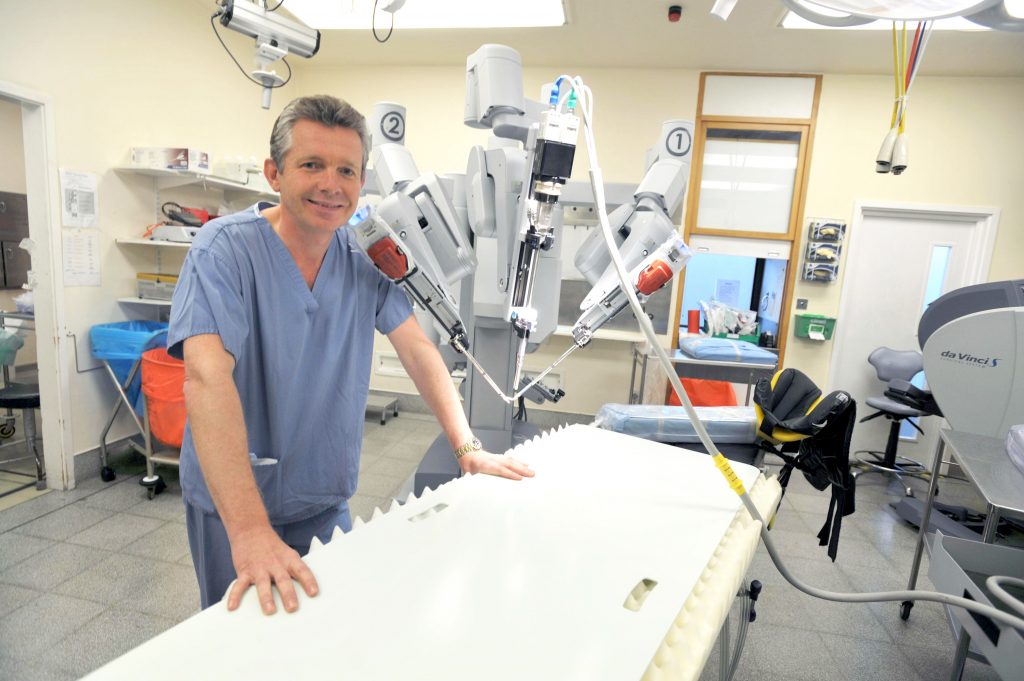Any man with prostate cancer – in the UK and possibly beyond – is likely to have benefitted in some way from the work of urologist Professor Stephen Langley.
He not only introduced brachytherapy into the UK (a form of radiotherapy that can eradicate cancer without many of the potential side-effects of surgery) it is Professor Langley we have to thank for introducing the template prostate biopsy which is a safer form of biopsy that is also more accurate than many other approaches.
He came upon the idea after being puzzled by a patient’s results.
‘I had a patient whose [PSA] blood tests strongly suggested cancer – but when I did a biopsy I could find no sign of any cancer,’ explains the Professor, who is also Director of Cancer Services at the Royal Surrey County Hospital in Guildford, the largest centre for early prostate cancer in the UK.
The type of biopsy accepted as the gold standard at the time was a trans rectal, during which a needle is inserted into the prostate through the wall of the rectum (or bowel). But Professor Langley realised there was a flaw with it.
‘I thought “hang on a moment, we are only taking a biopsy of the back half of the prostate this way – what about the part in front?”’
Professor Langley decided to try doing a biopsy taking a different approach, going through the perineum (the area between the anus and the scrotum). Rather than taking a sample from only one part of the prostate he took multiple samples from across the gland, guided by a template grid.
When he performed this new technique on his patient, sure enough this time he found cancer – and in time for it to be still curable.
His ‘Eureka’ moment has since benefitted thousands of men around the world.

Since Professor Langley first published his findings in 2004, the template biopsy has become one of the most commonly used forms of biopsies.
‘It is so exciting to develop a technique and then watch it being adopted around the world,’ he says.
His work on brachytherapy has also brought major benefits for patients. The treatment involves inserting minute radioactive ‘seeds’ into the prostate to destroy the cancer cells present there – Professor Langley pioneered its use in the UK in 1999, at a time when men had few options.
‘Having spent a lot of time surgically removing prostate cancer I was aware that that operation came with a lot of side effects,’ he says.
‘Men with prostate cancer who have a low risk of dying want a treatment that’s proportionate.’
Brachytherapy has proved to be a good alternative and many thousands of men in the UK have since had successful treatment with it.
In 2012 Professor Langley took it a step further, developing 4D brachytherapy which uses a combination of seeds on strands placed around the outside of the prostate, (minimising the risk of the seeds migrating elsewhere) and loose, individual seeds placed in the centre of the gland, optimising the dose.
The surgery to place them is now also done in a single 40-minute procedure, not two hours as was the case previously.
‘But the best thing is it improves the outcome for patients – the dose is more accurate, the technique is quicker and the risk of any erectile dysfunction afterwards is greatly reduced,’ says Professor Langley.
A trained robotic surgeon, Professor Langley believes there is still much work to be done to improve the outlook for men with prostate cancer, not least by making it easier for them to talk about it.
‘Prostate cancer can be mentioned at the dinner table now whereas before it used to be hushed up almost, but it’s still not talked about like breast cancer. For men prostate cancer is our breast cancer – we should talk about it more,’ he says.
And that’s one of the reasons he decided to get involved with NowWhat.
‘Men who have a good support network and access to reliable information that gives them a good understanding about their options have better outcomes – and that’s what we all want ultimately.’




